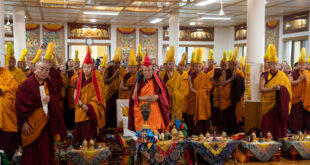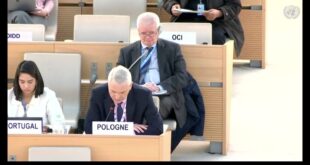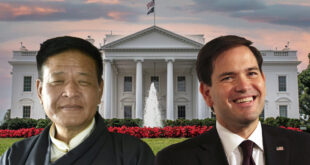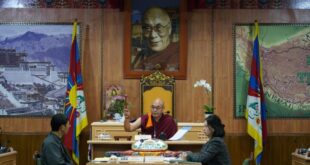Reconstruction work has added to unease over Beijing’s policies and fuelled tensions between Tibetans and Chinese settlers
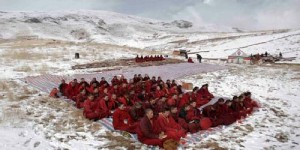
A year ago an earthquake devastated the Tibetan autonomous prefecture of Yushu, in Qinghai province, south-west China, claiming 3,000 lives. Now, it is in the throes of reconstruction. The tremor struck an area not previously affected by Chinese influence, putting an end to such splendid isolation. The residents of the main town, Gyegu (population 80,000, elevation 3,700 metres), have been moved out, one neighbourhood at a time, and the town will be rebuilt as a tourist centre, connected to the rest of China by new infrastructure.
The scale of the projected changes and the side-effects of such upheaval are causing great concern: “During the first three months there was an influx of Han Chinese – workers and engineers – to do the work. But they had to wait for the master plan. The Tibetans wondered what they were all doing here, causing considerable tension,” says a young Tibetan official nicknamed Tuhuor. Rebuilding work in early spring was hampered by a sit-in by several thousand Tibetans. For three days they put up banners demanding fair treatment. “The disaster has become an opportunity for the government to take over land. Officials turn up with the special police and threaten people, saying: ‘The sky belongs to the state and so does the earth’,” says the Tibetan writer Tsering Woeser, who lives in Beijing and writes a blog on the Tibetan regions. Some plots of land have been bought for a knock-down price, she has heard. Families are also complaining about having to build homes with no more than 80 sq metres of floor space, not enough for a large family. About 30 demonstrators have been arrested.
The shock caused by the quake itself and the subsequent opening to the outside world has revived deep-rooted resentment. The whole region is still extremely volatile, three years after the unrest of March 2008. Historically Yushu is part of Kham, a land of warriors, nomads and lamaseries to the north of the Tibet Autonomous Region (Tibet properly speaking). About 90% of the Yushu population are Tibetan. During the rescue operations in April 2010 Chinese television focused exclusively on the efforts of the Chinese military, paying little attention to the monks who turned up in large numbers to clear the wreckage and search for survivors.
Chinese planners now want to make Yushu a hub, connecting the region by road and rail to Xining, a big city at the eastern extremity of the province, and to Sichuan, Tibet and Yunnan, according to the head of the town’s reconstruction bureau. “In three years we will do what would have taken 20 years to achieve.” The authorities are also planning to change the name of the town to Sanjiangyuan, after the nearby nature reserve that contains the headwaters of the Yellow river (Huang He), the Yangtze and the Mekong. “Adopting this new Han name will cut Tibetans off from their history and culture,” Woeser says. In a report published last year on the origins of the 2008 uprising, Gongmeng, a Chinese NGO, deplored the fact that “economic development” and “modernisation of all aspects of social life” should be seen as a remedy for the problems afflicting Tibetan regions. On the contrary such measures above all prompted “a sense of panic and crisis” among local people.
The local economy has already changed significantly. In recent years the semi-nomadic stock raisers have been forced to sell their herds and settle in town. They have moved into two types of business in particular: breeding Tibetan mastiffs, the latest fad for China’s nouveau riche; and picking yartsa gunbu, the caterpillar fungus reputed for its remarkable medicinal properties, which fetches a very high price elsewhere in China. But it is only found in limited quantities and the main beneficiaries are the middlemen, not the pickers.
In Gyegu, the Han Chinese are quick to raise the issue of ethnic tension. “It’s chaos,” we were told repeatedly, followed by warnings not to venture out after dark. But in fact the police are stationed on the outskirts of town, with regular evening patrols. Xu Caigang first came to Gyegu in 2001 to work on a building site. He subsequently came back with his wife and opened a small shop, as well as sharing a taxi business with a friend. Xu is disgusted by the way he has been treated since the tremor. “We didn’t get a tent,” he says, “nor the 10 yuan [$1.50] a day subsidy. My brother died in the quake but my sister-in-law got nothing at all. It’s very unfair.” He is fed up with this bit of the Chinese far west where law and order are even more haphazard than elsewhere in the People’s Republic. The powers granted to local party executives have turned them into a “new Tibetan aristocracy with limited administrative capability and a retrograde understanding of government”, according to the Gongmeng report.
Young Tibetans are increasingly aware of the opportunities offered by modernisation. But on the whole they are puzzled. “It’s true that we all want to have modern things,” says Karma, a young English teacher who worked in Nepal for eight years. “But this is a huge country and our houses are getting smaller. Our land is controlled by the Chinese and the government.”
Karma earns 1,000 yuan ($150) a month. Three of his brothers are monks and his family sends them money. He does not much like the piety and superstition in which Tibetans indulge. “They give all they have to the temples. That’s no good either,” he says. “The Dalai Lama says we must not fight the Chinese, that historically they are our friends, and that what counts above all is to get an education.”
Going away to India or Nepal is often the only way for members of the poorest Tibetan families to gain an education. The Chinese government sends the children of nomadic communities to school, but forces them to learn Mandarin [Chinese], which does not go down well. Prosperous Tibetans send their children to study in Xining, accompanied by a Tibetan tutor, according to Tuhuor, who has a university degree.
“The new generation want their children to be better educated but they are worried about them losing contact with their roots,” Tuhuor says. Everyone in Yushu seems to be wondering what the future holds, particularly if Gyegu becomes a prime destination for mass Chinese tourism.
This article originally appeared in Le Monde

